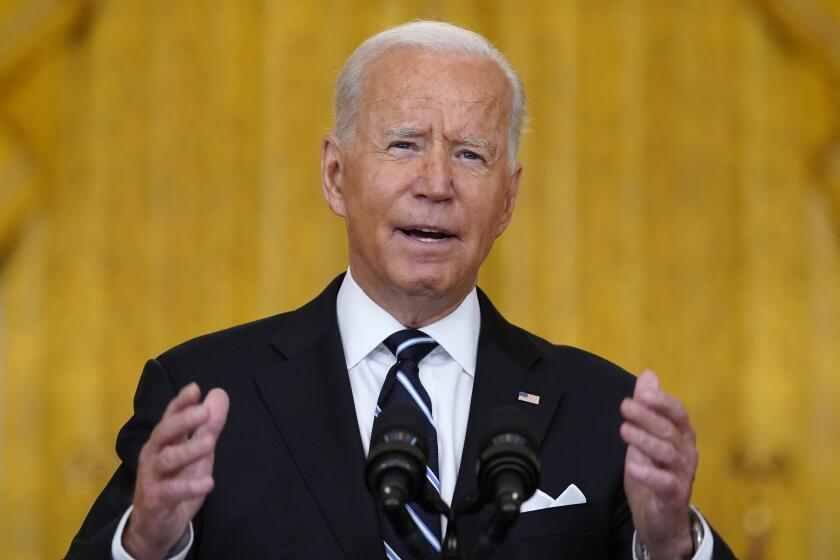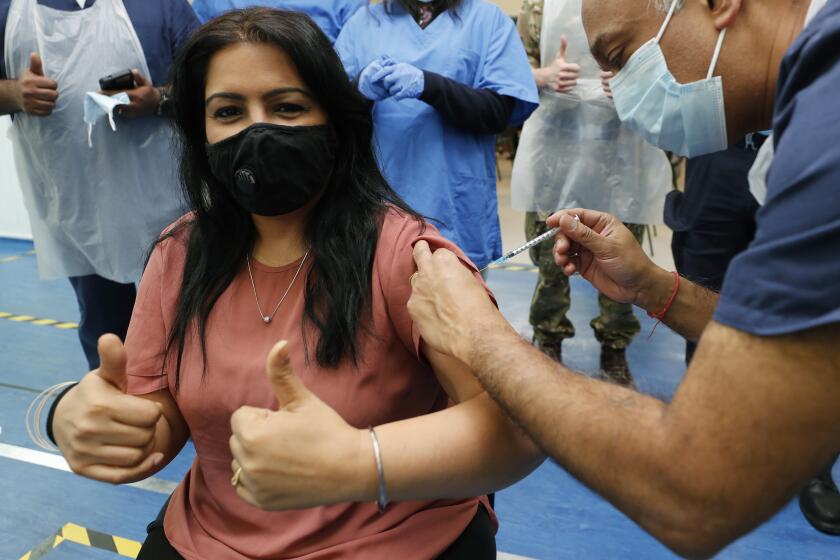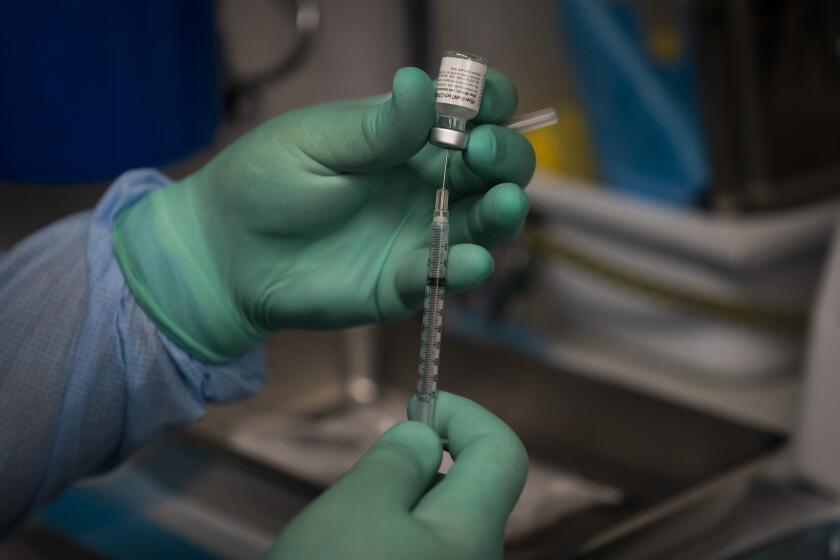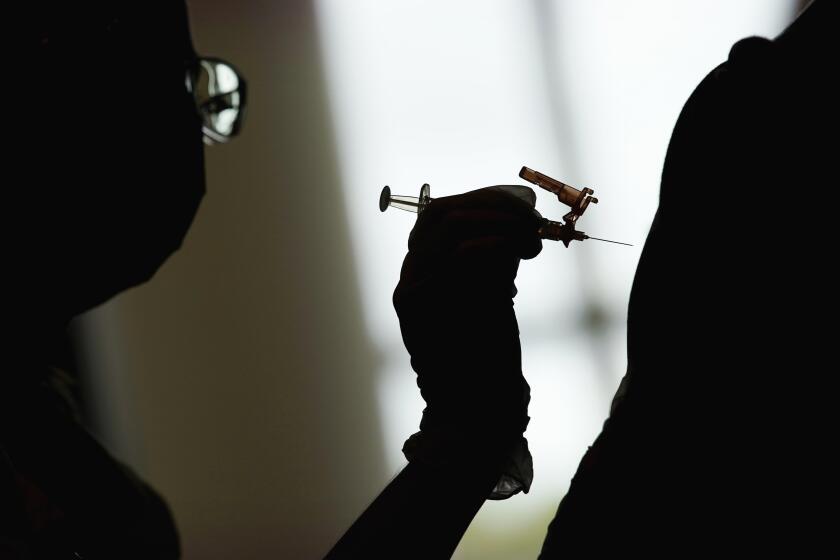FDA panel backs Pfizer booster shots for elderly and others at high risk
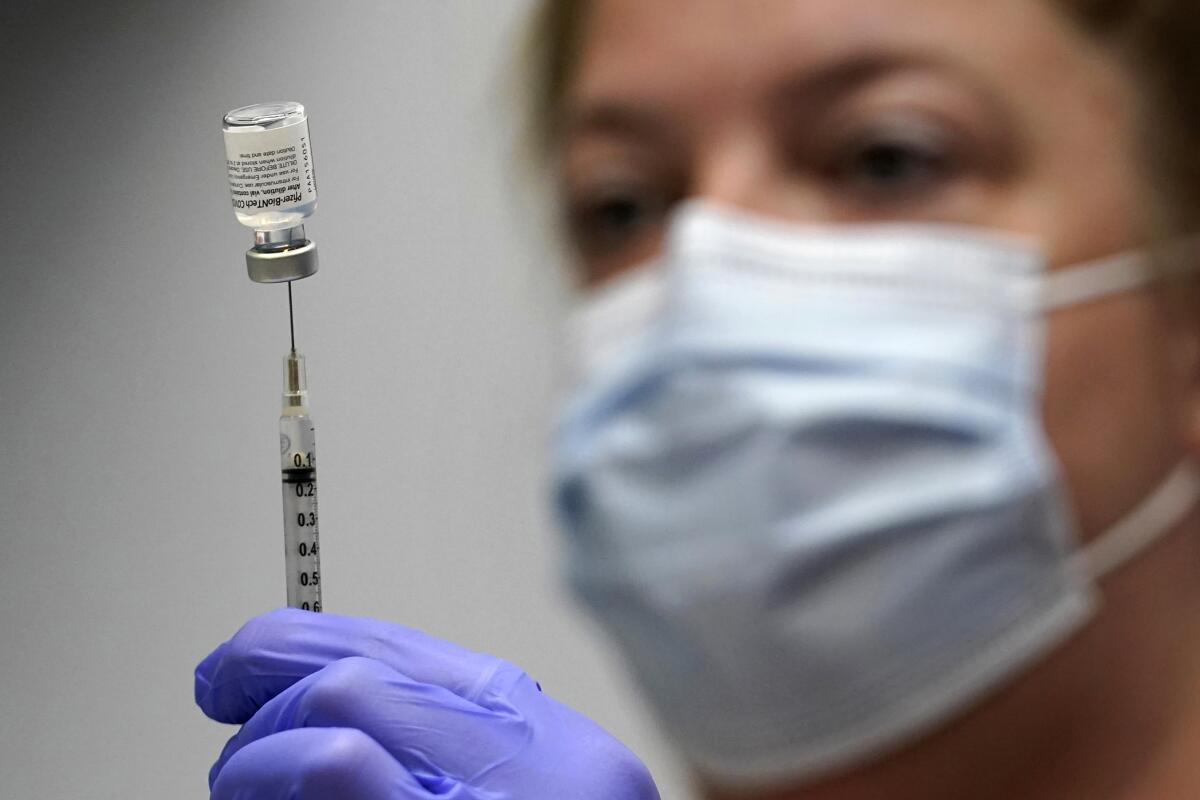
- Share via
WASHINGTON — An influential federal advisory panel has overwhelmingly rejected a plan to give booster shots of Pfizer-BioNTech’s COVID-19 vaccine to most Americans, but it endorsed the extra shots for those who are 65 or older or run a high risk of severe disease.
The votes Friday represented a challenge for the Biden administration’s sweeping effort to shore up nearly all Americans’ protection amid the spread of the highly contagious Delta variant.
The decision was made by a committee of outside experts who advise the Food and Drug Administration.
The initial vote on the widespread use of boosters was 16 to 2, with members expressing frustration that Pfizer had provided little data on the safety of extra doses. Many also raised doubts about the value of mass boosters, rather than ones targeted to specific groups.
Then, in an 18-0 vote, the panel endorsed the extra shot for select portions of the U.S. population — namely, those most at risk from the virus.
Health officials recommended people receive a booster shot eight months after their second dose of COVID-19 vaccine, ‘to maximize protection.’
The more narrow endorsement will help part of the Biden administration’s campaign but will still signify a step back from the sweeping plan proposed by the White House a month ago to offer booster shots of both the Pfizer and Moderna vaccines to nearly all Americans eight months after they get their second dose.
The FDA advisory panel’s votes are the first major hurdle that the Biden administration plan faced. The FDA itself has yet to make its own determination but typically follows the recommendations of its expert panel.
During several hours of vigorous debate Friday, members of the panel questioned the value of offering boosters to nearly everyone.
“I don’t think a booster dose is going to significantly contribute to controlling the pandemic,” said Dr. Cody Meissner of Tufts University. “And I think it’s important that the main message we transmit is that we’ve got to get everyone two doses.”
Dr. Amanda Cohn of the Centers for Disease Control and Prevention said: “At this moment it is clear that the unvaccinated are driving transmission in the United States.”
Panel members also complained that data provided by Israeli researchers about their booster campaign might not be suitable for predicting the U.S. experience.
Scientists inside and outside the government have been divided in recent days over the need for boosters and who should get them, and the World Health Organization has strongly objected to rich nations giving a third round of shots when poor countries don’t have enough vaccine for their first.
While research suggests immunity levels in those who have been vaccinated wane over time and boosters can reverse that, the Pfizer vaccine is still highly protective against severe illness and death, even amid the spread of the highly contagious Delta variant.
An expert advisory panel recommends that the British government offer a third COVID-19 vaccine dose to everyone over 50 beginning in the fall.
In another step to the process, a CDC advisory committee that sets policy for U.S. vaccination campaigns will meet Wednesday to debate who should get boosters and how many months after their second dose they should receive the extra shot.
The CDC has said it is considering boosters for older people, nursing home residents and front-line healthcare workers rather than all adults.
Separate FDA and CDC decisions will be needed in order for people who received the Moderna or Johnson & Johnson shots to get boosters.
The FDA panel’s rejection came despite full-throated arguments about the need for boosters from both Pfizer and health officials from Israel, which began offering boosters to its citizens in July.
Sharon Alroy-Preis of Israel’s Ministry of Health said the booster dose improves protection tenfold against infection in people 60 and older.
“It’s like a fresh vaccine,” bringing protection back to original levels and helping Israel “dampen severe cases in the fourth wave,” she said.
And representatives for Pfizer argued that it is important to shore up immunity before protection against severe disease starts to erode. A company study of 44,000 people showed effectiveness against symptomatic COVID-19 was 96% two months after the second dose but had dropped to 84% by around six months.
Pfizer and the Israeli representatives faced skepticism by panelists. Several expressed doubt about the relevance of Israel’s experience to the U.S. Also complicating the committee’s decision: No one yet knows the antibody level below which infection is likely and boosters are needed.
Another concern was whether third doses would exacerbate serious side effects.
Some scientists say the average person doesn’t need a COVID-19 booster yet, highlighting the intense scientific divide over the issue.
Meissner of Tufts said he is worried about extra doses for younger age groups given the risk of heart inflammation that has been seen in mostly younger men after a second dose. While the condition is very rare, he said, it is not clear whether that risk would increase with another dose.
Pfizer pointed to Israeli data from nearly 3 million boosters to suggest side-effect rates would be similar to that seen after second doses.
Dr. Paul Offit, a vaccine expert at Children’s Hospital of Philadelphia, said he was more likely to support approving a third dose for adults over 60 or 65, but “I really have trouble” supporting it for anyone down to age 16.
While an extra shot would probably at least temporarily decrease cases with mild or no symptoms, “the question becomes what will be the impact of that on the arc of the pandemic, which may not be all that much,” Offit said.
President Biden’s top health advisors, including the heads of the FDA and CDC, first announced plans for widespread booster shots a month ago, targeting the week of Sept. 20 as an all-but-certain start date. They said boosters would be dispensed eight months after the second dose of the Pfizer and Moderna vaccines.
But that was before FDA staff scientists had completed their own assessments of the data. Some experts questioned whether Biden was contradicting his pledge to “follow the science” on COVID-19 by getting out ahead of government scientists.
President Biden’s plans to start delivery of booster shots by Sept. 20 for most Americans who received COVID-19 vaccines are facing new complications that could delay the availability for those who received the Moderna vaccine.
Earlier this week, two top FDA vaccine reviewers joined a group of international scientists in publishing an editorial rejecting the need for boosters in healthy people. The scientists said continuing studies show the shots are working well despite the Delta variant.
On Friday, U.S. Surgeon General Vivek Murthy said that in announcing its booster plan, the Biden administration was not trying to pressure regulators to act but was trying to be transparent with the public and be prepared in the event that extra shots won approval.
“We have always said that this initial plan would be contingent on the FDA and the CDC’s independent evaluation,” Murthy said.
The Biden plan has also raised major ethical concerns about impoverished parts of the world still clamoring for vaccine. But the administration has argued that the plan is not an us-or-them choice, noting that the U.S. is supplying large quantities of vaccine to other countries.
The U.S. has already approved Pfizer and Moderna boosters for certain people with weakened immune systems, such as cancer patients and transplant recipients.
Some Americans, healthy or not, have managed to get boosters, in some cases simply by showing up and asking for a shot. And some health systems already are offering extra doses to high-risk people.
More to Read
Sign up for Essential California
The most important California stories and recommendations in your inbox every morning.
You may occasionally receive promotional content from the Los Angeles Times.
